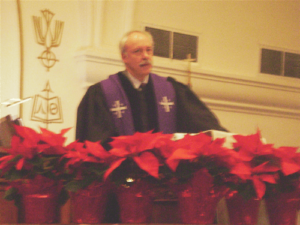Unbound‘s Managing Editor, Patrick David Heery, was ordained on December 11, 2011, by the Presbyterian Church (U.S.A.) to the Ministry of Teaching Elder (formerly, Word & Sacrament). The service took place at the First Presbyterian Church of Athens, Ohio. In May, Patrick was called to serve with the Advisory Committee on Social Witness Policy, after graduating with a Master of Divinity from Princeton Theological Seminary. His primary task? To help bring online a social justice journal and successor to the print journal, Church & Society. That journal, which became Unbound, was to awaken Christian conscience in the face of gross injustice, a mission that extends back to the Exodus of the Israelites, the pronouncements of the Hebrew prophets, and the Gospel of Jesus Christ. You can read more about the mission of Unbound here.
Patrick was ordained wearing the pulpit robe in which his great grandfather preached every Sunday many years ago. Before offering the benediction, Patrick read a selection from Rainer Maria Rilke’s Letters to a Young Poet, with the charge: “Live the questions.”
Below is the charge offered by Unbound‘s Senior Editor, the Rev. Dr. Christian Iosso, at the ordination service.
Unbound congratulates Patrick on this new step in his ministry and hopes that the following charge might “charge” all of us as we envision and create the web journal and community that is Unbound: An Interactive Journal of Christian Social Justice.
________________________________________
On Being A Scribe for the Reign of Heaven
(This text reflects some additions made in delivery without text, as well as sections prepared but not delivered.)

Friends,
It is a great pleasure to be here and above all, to thank you for your contributions to the calling that Patrick is bringing to the Church. You have helped him as he was already exercising his call to ministry on the nearby campus. I have also heard much about Patrick’s home church (Mount Washington Presbyterian Church of Cincinnati, Ohio) by listening in on a conversation between Patrick and Sara Pottschmidt Lisherness, the Director of the GAMC’s Compassion, Peace, and Justice ministry unit, who turns out to be a daughter of that congregation. So we are here to perform an ordination that marks a ministry already clearly in evidence, well nurtured in two congregations. (It was also great to hear Bethany’s sermon and reminder that ministry is more than a 9-5 job—music for the boss’s ears!)
I do not have a sermon, but I do have a one-line text: “Therefore every scribe who has been trained for the kingdom of heaven is like a householder who brings out of their treasure what is new and what is old” (Matthew 13: 52). As managing editor of Unbound, you are a scribe of the kingdom or reign of God. That much is clear. But what is the new, and what is the old, and how are they to be combined? It is not simply about Old Testament and New Testament, as Matthew was writing his part of the New Testament—drawing on Mark and many Old Testament promises, seeing them fulfilled in Christ.
More guidance about the old and new and their right mix comes from the parable that precedes our text about the Christian scribe’s teaching role. It follows the parable of the wheat and the tares, or weeds of the world, with images of the angels being sent to harvest the good grain and burn off the rest. Jesus’ message is toleration and co-existence in a world that has evil in it, though God’s judgment is also there and Matthew seems to amplify it a bit. So not all the tares are immediately toxic, even if they do not contain the newness of the Gospel wheat. But perhaps justice is to be the guide for the kingdom scribe’s own judgment. Let’s see this with a test case.



Unbound Social